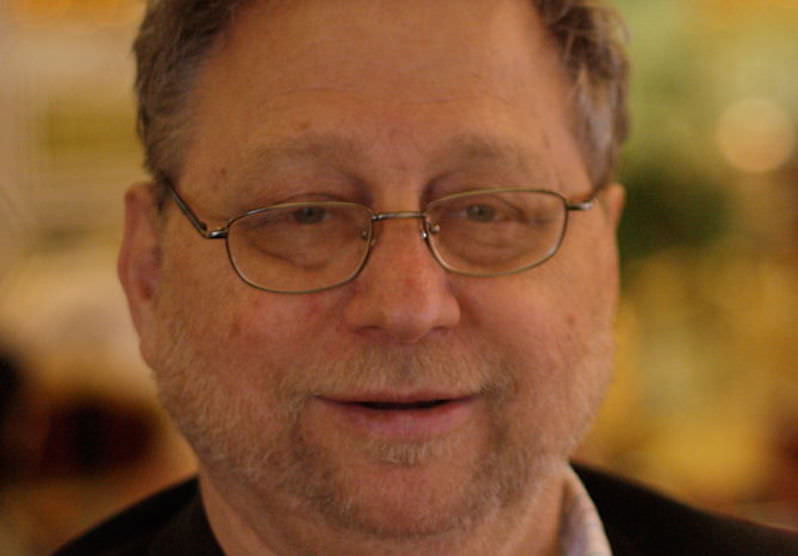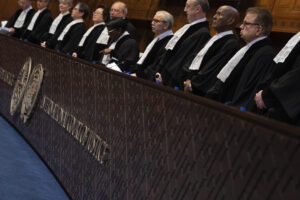Truthdigger of the Week: Danny Schechter
In a lifetime of media activism, the late journalist and human rights activist Danny Schechter was best known for his advocacy of public media and his work to inform the world of life under South Africa's apartheid regime.The late journalist and activist Danny Schechter was known for his advocacy of public media and his work to shine a spotlight on South African apartheid. Flickr / Mohamed Nanabhay (CC-BY)
Flickr / Mohamed Nanabhay (CC-BY)
Flickr / Mohamed Nanabhay (CC-BY)
Every week the Truthdig editorial staff selects a Truthdigger of the Week, a group or person worthy of recognition for speaking truth to power, breaking the story or blowing the whistle. It is not a lifetime achievement award. Rather, we’re looking for newsmakers whose actions in a given week are worth celebrating.
“Facts,” the great investigative journalist I.F. Stone said, “are subversive.”
If this statement belongs to anyone, it is to Danny Schechter, “the news dissector,” who died last week at the age of 72. A remarkable pioneering figure who wore many hats — human rights activist, journalist, author, television producer and independent filmmaker — he lived a huge life and relentlessly spoke back to power.
Schechter grew up in the Bronx, in the union-sponsored Amalgamated Houses, when the New York borough “was the Promised Land for working-class Jews like his parents,” his longtime friend Bill Adler recalled in a post on Schechter’s Facebook memorial page. “He attended a Yiddish summer camp for years. Although not all of Danny’s heroes were Jewish by any means, he was clearly inspired by I.F. Stone and Bob Dylan, among many others.”
Throughout his media activism, Schechter merged Stone’s “stark and serious old-school” style with an “understanding of media power and manipulation with a wild and joyous Yippie-infused determination to rip it up and start again,” John Nichols wrote at The Nation.
A close comrade of Abbie Hoffman and Paul Krassner, Schechter was a self-professed “SDS symp, a Yippie in spirit, and an observer by training.” In August 1963, along with 300,000 mostly black demonstrators, he joined the March on Washington, which he describes in his 2011 book, “Blogothon: Reflections and Revelations From the News Dissector”:
The March and the Movement changed many of our lives. … After the March ended, the leaders went to the White House. I recommitted myself to the Movement and dropped out of Cornell. I moved to Harlem to work for the Northern Student Movement full time, and ended up editing the magazine Freedom North. That night, I wandered over to a big D.C. hotel where many of the leaders were staying and celebrating the fact that the march was consummated so peacefully and successfully. I stayed in D.C. and actually ran into Malcolm X, who was there but did not come to the March. The movement activists were debating the March’s impact. The next morning, in a torrential rain, the hard rain that Dylan said was gonna fall, I took the bus back to Bal’more wondering how we could ever top the great March on Washington. None of this takes away from the magic of that moment and the fact that 40 years on, I am still thinking about those days and how they changed our world, at least in part.
Schechter came of age in the ferment of the 1960s, and was “part of that ferment,” he wrote in “Blogothon”:
I sucked at its breast and fed off its energy. It defined me. It trapped me. I walked picket lines in Harlem and sang — scared shitless — in churches in backwoods Mississippi. I marched with Martin Luther King to the Lincoln Memorial in ’63 and dreamed his dream, even as I identified with the freedom soldiers of SNCC and the saintliness of Fannie Lou Hamer et al. I read Ginsberg and later loved Leary. I advised Abbie and fought with the SDS to free the Chicago 8.
In 1971, he began to introduce himself to listeners of Boston’s WBCN radio station as “Danny Schechter, your news dissector.” Rory O’Connor, his business partner for more than three decades, said Schechter found his voice in the media so that he could “do something about the problems of the world.” As Schechter himself once said, “I learned the media was one of the problems of the world.”
Schechter became an Emmy-winning producer at ABC’s “20/20” and helped to launch CNN, but later he left corporate media to found Globalvision, a production company best known for the groundbreaking television series “South Africa Now.” At the London School of Economics in the 1960s, Schechter had become close friends with the legendary South African activists Ruth First, who was murdered by a parcel bomb in 1982, and Joe Slovo, who became a commander of Umkhonto we Sizwe, the armed wing of the African National Congress. “Well, you know, I had the fortune of being at the London School of Economics in the ’60s, at the right place at the right time, where the ANC people had come into exile,” Schechter explained on “Democracy Now!” “And in my class was remarkable woman, Ruth First, who became sort of my mentor about South Africa,” he added. “And I was recruited by the ANC to go into South Africa. They couldn’t get their people in because so many of them were in prison and well known to the security police. So, people from England, what were then called the “London recruits,” were sent into South Africa on various missions. I was one of them — naive, perhaps, to do this, unaware, really, of the consequences that awaited me if I was — if I was caught. But I went anyway as an act of solidarity.”
Fighting apartheid was perhaps his most enduring cause, and Schechter was instrumental in raising awareness and opening democratic discourse on South Africa. All the while working closely with the ANC, he made six documentary films about Nelson Mandela, founded the Africa Research Group, and was organizer, along with Steven Van Zandt, of Artists United Against Apartheid, who released the 1985 album “Sun City.”
Of his 12 books, the most recent, “When South Africa Called, We Answered,” provides an important testament to the ANC as a people’s movement and offers a rousing account of radicalism and international solidarity against corporate media’s later deification of Mandela.
“Unfortunately, a media that lionizes change-makers from above,” he wrote, “and ignores movements from below, will always downplay that lesson, lest they encourage similar struggles beyond borders on today’s global issues. As a friend once told me when I went to South Africa at age 25 to enlist in that then-against-all-odds freedom struggle, ‘It’s not the ship that makes the waves, but the motion on the ocean.’ “
Fiercely critical as he was, Schechter was optimistic until the end about the potential of public access and new media for a generation of citizen journalists. As he wrote in Newsday in 1993, “a growing segment of the public wants to be involved with new media. The boom in online computer networks and even radio talk shows demonstrates the demand and the need — which the media giants are unlikely to satisfy. … Let’s hope that the Congressional watchdogs who are questioning the anti-trust implications of these new monopolies-in-the-making will speak out to preserve public access. In commercial television, everything is slick, but little matters. Its edges may be rough, but public access should matter to us — not only for what it is, but for what it can become.”
Schechter knew why this mattered. Looking back on his “movement days,” he mused, “even though I know now how naive we were, how arrogant, how out-maneuvered, how cointelproed, and LBJed and Nixoned. We won the decade but lost our way, self-destructed and sub-cultured. We made mistakes big time, confused motion with movement, and radicalism with revolution — but Grandmaster Hoffman had it right: ‘We were right.’ “
“Once you kiss a possible future,” Schechter wrote, “or imagine a new way of living and being, its taste never quite goes away.”
Danny Schechter, who died from pancreatic cancer March 19, was a lifelong radical, multitasking mensch and inimitable “news dissector.” He is our Truthdigger of the Week.
Your support matters…Independent journalism is under threat and overshadowed by heavily funded mainstream media.
You can help level the playing field. Become a member.
Your tax-deductible contribution keeps us digging beneath the headlines to give you thought-provoking, investigative reporting and analysis that unearths what's really happening- without compromise.
Give today to support our courageous, independent journalists.






You need to be a supporter to comment.
There are currently no responses to this article.
Be the first to respond.